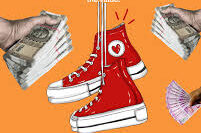The sneaker and luxury shoe market has evolved from a niche hobby to a full-fledged investment opportunity. With rare and limited-edition shoes appreciating in value, investing in shoes has become as lucrative as stocks, real estate, and cryptocurrency. Whether you’re a sneakerhead, a reseller, or a long-term investor, understanding the intricacies of the shoe investment market can help you make informed decisions and maximize profits.
Why Invest in Shoes?
1. High Demand and Limited Supply
Brands like Nike, Adidas, and Jordan release limited-edition sneakers that create hype among collectors. Due to their scarcity, the resale value of certain models can skyrocket within days or even hours of release.
2. Impressive ROI (Return on Investment)
Certain sneakers have shown significant appreciation over time. For example, the Nike Air Yeezy 2 “Red October”, which originally retailed for $250 in 2014, now sells for over $10,000 in the resale market.
3. Diverse Investment Avenues
Investors can profit from shoes in multiple ways, such as flipping (short-term resale), holding (long-term investment), or participating in sneaker stock markets like StockX, GOAT, and eBay’s authentication program.
4. Cultural and Fashion Influence
Sneakers are more than just footwear—they’re cultural artifacts that shape fashion, music, and sports. As their influence continues to grow, so does their market value.
How to Start Investing in Shoes
1. Research and Stay Updated
To succeed, investors must stay informed about upcoming sneaker releases, collaborations, and historical resale trends. Websites like Sneaker News, Hypebeast, and Sole Collector provide essential updates.
2. Choose the Right Platform
Platforms like StockX, GOAT, and Stadium Goods ensure secure transactions and provide authentication services to prevent counterfeits.
3. Understand Sneaker Authentication
Fake sneakers flood the market, making authentication crucial. Learning about common telltale signs of counterfeit shoes, such as stitching quality, material differences, and packaging, helps in making safe investments.
4. Start Small and Scale Gradually
Instead of jumping into high-ticket items, begin with lower-risk sneakers that have moderate resale value. As your experience and capital grow, you can diversify your investment portfolio.
Best Shoes to Invest In
1. Nike Air Jordans
Air Jordans, particularly vintage releases and limited collaborations, consistently hold their value. The Jordan 1 Retro High OG models are among the most sought-after.
2. Adidas Yeezys
Despite production fluctuations, rare Yeezy models still command high resale prices. The Yeezy Boost 350 V2 and 700 series are solid investments.
3. Nike Dunks and SB Dunks
Nike Dunks have regained popularity, with special releases like the Travis Scott x Nike SB Dunk Low fetching thousands of dollars.
4. Luxury Designer Sneakers
Brands like Balenciaga, Gucci, and Dior offer luxury sneakers that retain value due to their exclusivity and premium craftsmanship.
Risks and Challenges of Shoe Investment
1. Market Volatility
Like any investment, sneaker prices fluctuate based on trends, demand, and brand strategies.
2. Counterfeit Market
Fake sneakers are a persistent issue. Buying from reputable sources and using authentication services is essential.
3. Storage and Maintenance
Proper storage in temperature-controlled environments prevents deterioration. Sneaker investments require careful handling to maintain value.
4. Liquidity and Sales Tax
Unlike stocks, shoes are not instantly liquid. Some platforms charge seller fees, and taxes may apply to high-value transactions.
FAQs About Investing in Shoes
1. Are sneakers a good investment?
Yes, sneakers can be a great investment if you research trends and buy wisely. Limited releases often appreciate significantly in value.
2. How much money do I need to start investing in shoes?
You can start with as little as $100-$200 by targeting moderately priced sneakers with good resale potential.
3. Where can I sell sneakers for profit?
Popular platforms include StockX, GOAT, eBay, and local sneaker consignment stores.
4. How do I know if a sneaker will increase in value?
Factors like brand collaboration, limited production, celebrity endorsement, and historical price trends influence value appreciation.
5. Is investing in luxury shoes worth it?
Luxury shoes from brands like Dior and Balenciaga hold value, but their market is more niche than sneaker investments.
6. How do I store sneakers for long-term investment?
Keep sneakers in a cool, dry place in their original box, use silica gel packets to control moisture, and avoid direct sunlight to prevent yellowing.
7. Can I lose money investing in sneakers?
Yes, if trends shift or you purchase fake or overhyped shoes, you may face losses. Always research before investing.
Conclusion
Shoe investment is a booming market that blends fashion, culture, and finance. With the right knowledge, strategic buying, and secure resale channels, investors can build a profitable portfolio. Whether you’re flipping for quick profits or holding for long-term appreciation, the sneaker market offers exciting opportunities for both beginners and seasoned investors.




Spot on with this write-up, I actually suppose this web site needs far more consideration. I’ll probably be again to learn much more, thanks for that info.